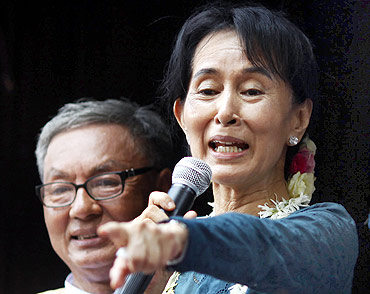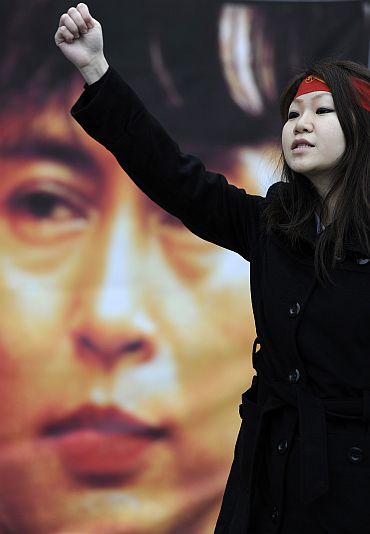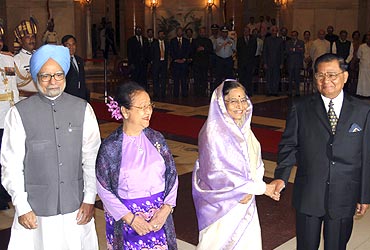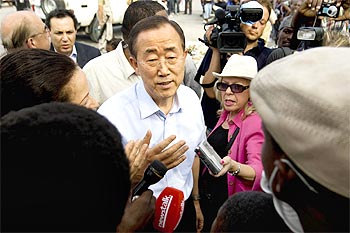According to a United States embassy cable released by WikiLeaks, Prime Minister Dr Manmohan Singh had himself raised the issue of democracy with Myanmar's military leader Than Shwe during the latter's visit to New Delhi. In a meeting with US embassy officials, Mitra Vashishta, the joint secretary, Southeast Asia, said that India would welcome US suggestions on how to best to promote democracy in Myanmar.
Asserting that sanctions had only isolated the country, she said if India also isolates Myanmar, "no one will be able to engage Rangoon (now Yangon) on democracy or other issues". Expressing concern about Chinese influence in Myanmar, Vashishta said that the State Peace and Development Council has been "learning from the master about how to hoodwink the international community" on human rights.
She said India had agreed to provide grants and limited military equipment to Rangoon in an attempt to encourage cooperation against anti-India insurgents located along the Indo-Burma border. "However, there are no Indian plans to conduct joint military operations with the junta," said the cable.
...
Myanmar's democracy closely linked to Sui Kyi: Indian diplomat
Dr Singh himself raised the issue with Than Shwe "in a much more intense way than could be expressed" in the media, she said, noting that India had decided to take this up with its neighbouring country despite "potentially negative consequences for the relationship".
According to Vashishta, democracy in Burma is too closely linked with the greatly respected Sui Kyi, whose day has come and gone.
She said Than Shwe had expressed a commitment to democracy during the visit, and speculated that he would be more apt to bring about democratic reform if he could do so without losing face. The cable does not say if the meeting between the US and Indian diplomats was official or was an unofficial conversation.'India, a democratic role model for Myanmar'
Image: Myanmar's Senior General Than Shwe and his wife Daw Kyaing Kyaing with President Pratibha Patil and Prime Minister Manmohan SinghShe commented that Myanmar's delegation was "willing to do anything" to have that paragraph removed, adding that the inclusion of the paragraph was a "coup for India". The final version of the document released on October 29 expressed support for national reconciliation and an early transition to democracy in Myanmar, the cable said.
Asked about New Delhi's plan to further encourage democracy in Burma, Vashishta responded that Rangoon considers India a democratic role model, and emphasised that the GOI has the 'best credentials' to promote democracy there.
"She mused that democracy could only be established through grassroots initiatives, and stressed that India would do whatever it takes to empower the people of Burma in this respect," the cable said.
The US official "underlined US concerns about the lack of democracy in Burma and expressed the hope that India would continue to press this issue with the junta," the cable said.
"Vashishta reiterated India's belief that only constructive engagement of the military regime could bring about any meaningful change, saying sanctions have only isolated Burma, and have not encouraged democratic reforms there," it said.
She said the country is so isolated that members of Than Shwe's delegation wondered whether they would have to "go nuclear" to get US attention, noting the comparison to Pakistan.'UN should make an attempt to be more pro-Myanmar'
Image: UN Secretary-General Ban Ki MoonThe European Union is too obvious, shabby, shortsighted and full of contradictions to play a meaningful role in Myanmar, she argued, while Thailand takes a pro-active approach to Yangon only because one of their ministers wants to be the next UN Secretary General, it said.
She said that China would like an Indian Ocean port and hopes to project its influence everywhere India does, it said. Vashishta argued that what you hear about the China's People's Liberation Army in Burma is only the tip of the iceberg, as US intelligence must know. Myanmar's engagement with India stems in part from Yangon's belief that China takes them for granted, she asserted, the cable said.





article